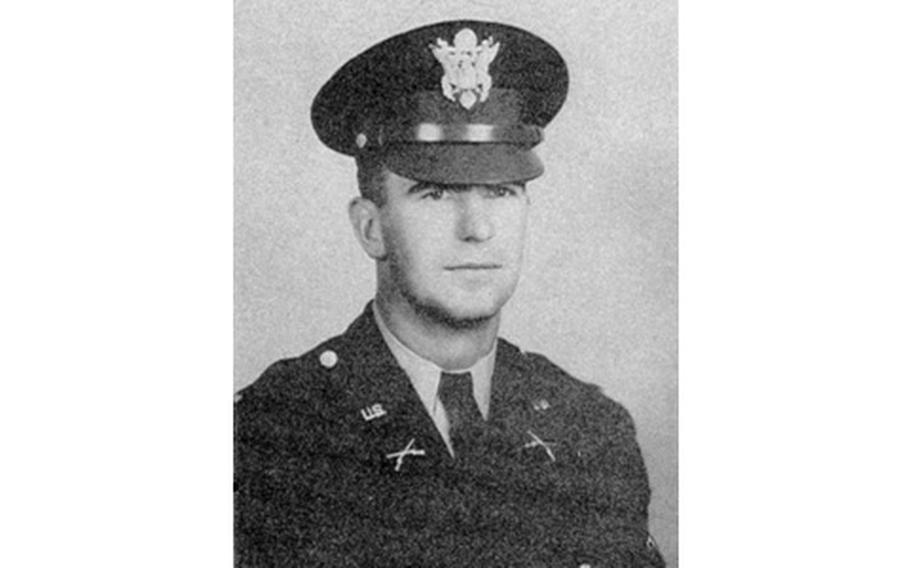
Edward Gerard Flanagan. (Defense POW/MIA Accounting Agency)
NORTH ROYALTON, Ohio (Tribune News Service) — For Brian Flanagan, family history research was a link to his father’s family.
Flanagan’s father was the youngest of nine children, who grew up on a cotton farm in the Oklahoma Dust Bowl. The siblings scattered once they all left home. Brian’s parents didn’t marry until his father was in his late 30s, and Brian wasn’t born until his dad was 46.
“Just because of the family dynamics, I have many first cousins — many of them in their 80s now — that I have never met,” he explained. “So, genealogy was one way for me to connect, and learn about, my dad’s side of the family.”
One cousin had always remained a mystery: Lt. Gerry Flanagan, who died in the Korean War.
Gerry Flanagan was the only child of an uncle who had divorced and had passed away in 1950s. Multiple internet searches, as well as searches on military databases for Lt. Gerry Flanagan proved fruitless.
Then Brian Flanagan got lucky. A friend was riding his motorcycle through the Smokey Mountains, and Brian had heard there was a cross in memory of Gerry at his aunt’s church, so he asked if the buddy would take a photo.
“There was the clue I needed,” says Brian. “Whenever the family spoke of him, they always referred to him as ‘Gerry,’ but the plaque on the back of the cross said Lt. Edward Gerard Flanagan. As soon as I got to a computer and typed in the name ‘Edward Gerard Flanagan,’ a ton of information came up.”
Gerry Flanagan enlisted in the U.S. Army when he was just 18 years old.
While stateside, he served in the 3rd Infantry Regiment — known as ‘The Old Guard’ — in Washington D.C., the U.S. Army’s official ceremonial unit. While attached to that unit, his duties included performing countless military honors for service members’ funerals at Arlington National Cemetery.
When the United States joined the war in Korea in 1950, Lt. Flanagan volunteered for duty on the front lines.
As far as Flanagan can determine, Gerry was only in Korea for about three months when he volunteered to lead a raid on “Heartbreak Ridge.”
Enemy soldiers had dug an underground command post near “Sandbag Castle,” where American soldiers were under constant machine gun fire from the enemy. The plan was for a small 19-man raiding party to go in before dawn and drop charges down the air shafts to destroy the tunnels, which would eventually give the Chinese deadly access to American troops defending the ridge.
According to “The Story of the Wolfhounds,” a history of Lt. Flanagan’s 27th Infantry Unit in Korea, Lt. Flanagan led the “most daring raid of the Korean War.”
Brian Flanagan has pieced together what happened through interviews with men in the unit, letters, and Stars and Stripes newspaper articles about the raid. Lt. Flanagan was wounded by enemy fire early in the battle. Despite being shot in the stomach, he continued to charge the enemy lines and direct his men to their objective during the 30-minute battle.
Lt. Flanagan died when he took a direct hit by a mortar landing at his feet. Sgt. Litchfield, who took command after Flanagan’s death is quoted: “We knew when we started out we weren’t coming back ‘til the mission was completed. We were scared at first, but not after we saw Lt. Flanagan charging right into the thick of enemy fire. He gave us the determination to really do the job up right. I’ve never known a braver guy.”
Lt. Edward Gerard Flanagan was the only man lost in the raid that day. Because of the intensity of the battle, his men were unable to recover his body. He was posthumously awarded the Distinguished Service Cross, the second highest military decoration for soldiers who display extraordinary heroism in combat with an armed enemy.
Lt. Flanagan’s body still lies in North Korea, in the heavily-mined Demilitarized Zone (DMZ). He is one of 5,300 American soldiers who remain in North Korea.
“I know that there are thousands and thousands of American soldiers who never made it home after fighting — and dying — for their country in other parts of the world, so in some ways, I guess Gerry’s story is not so special,” Brian Flanagan said, with tears in his eyes.
“It just strikes me that a man who performed probably thousands of military honors at a national cemetery will never be laid to rest with full military honors himself. And maybe that is what makes Gerry’s story unique. By telling his story, we can pay tribute to every other soldier who never made it home.”
©2023 Advance Local Media LLC.
Visit cleveland.com.
Distributed by Tribune Content Agency, LLC.